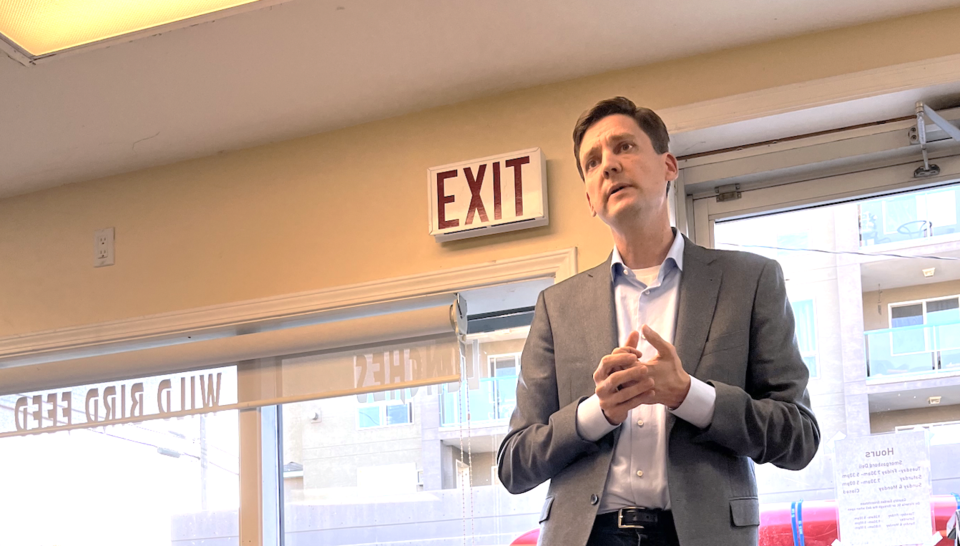What happens when a political leader spends 20 months fiercely defending a policy, accuses anyone opposed to it as living “in a baloney factory,” describes critics as unprincipled climate change deniers, and then, on the eve of a provincial election, out of nowhere, with their party getting challenged in the polls, flip-flops on the entire thing?
BC NDP Leader David Eby is about to find out after executing one of the biggest policy pivots of his premiership on Thursday, hurling the provincial carbon tax straight under the wheels of his campaign re-election bus.
Will it neutralize an “axe the tax” campaign the BC Conservatives intended to run in the election? Or will it morph into an issue of trust, leadership and character for a leader breaking his word?
“Our commitment is that if the federal government decides to remove the legal backstop requiring us to have a consumer carbon tax in British Columbia, we will end the consumer carbon tax in British Columbia,” Eby said Thursday.
The move was surprising on several levels — not the least of which is it’s a 180-degree reversal of everything Eby has said for years on the subject.
“For over a decade in this province a price on carbon pollution has been central to transitioning away from fossil fuels,” Eby said at the BC NDP convention last November, in a speech in which he accused BC United Leader Kevin Falcon of wanting to “rip up B.C.’s climate plan” because he opposed carbon tax increases.
“Let me be clear, we will not back down,” Eby said. “If, and God forbid, the rest of the country abandons the fight against climate change, B.C. will stand strong because we know what the costs are.”
At the same convention, Eby told reporters about the carbon tax: “All the other parties that seem to me, in an effort to win votes, are willing to sell their children’s future. I think it’s unacceptable, we won’t do it and we’ll support strong climate action.”
On Thursday, Eby blamed affordability concerns for failing to stand strong on a tax policy he once described as “a cornerstone of our climate strategy.”
“I’ve watched as a series of decisions from the federal government, including unsustainable hikes in the amount of money people have to pay, exempting certain provinces and products, and treating certain provinces differently, has really politicized the issue and made it difficult for British Columbians,” he said.
Yet Eby had been for months defending those increases as not only necessary to curb consumer behaviour, but also as affordable because his government claimed it returned more money to British Columbians through rebate programs than it cost people at the pump or on heating bills.
“Although there is a federally mandated carbon tax increase, we’re refunding the full amount back, plus more, to British Columbians to support them with affordability,” he told the legislature in April.
Eby framed sticking with the carbon tax as a matter of principled leadership.
“The carbon tax revenues are about supporting individuals and businesses in this important transition that our province has to make, and we believe that that is the best way to do it,” Eby said last November.
“And I don't understand why the leader of the BC Liberal/United party would be abandoning that at this point in time, especially after the summer, we had the wildfires, we saw the drought. The impacts on British Columbians to abandon our climate leadership position now … that's not leadership.”
Nor, Eby argued, was Prime Minister Justin Trudeau showing leadership when he began exempting home heating oil from the carbon tax last fall, to assuage angry Canadians concerned about affordability.
“Well, I understand the theme of the last week and a half has been Liberal leaders, facing pressure in the polls, flip-flopping on their position on the carbon tax,” he charged of both Trudeau and Falcon.
On Thursday, Eby’s opponents turned the flip-flop label back on to him.
“He’s been arguing for two and a half years now that the carbon tax was necessary, that it was the right thing to do, and now suddenly he flip-flops on that?” said BC Conservative Leader John Rustad.
“My question is, is he flip-flopping just because of politics? And then he’ll flip-flop again after the election?”
Rustad said Eby is now “campaigning against his own government policies” in a desperate bid to cling to power.
“He appears to be making policy on the fly and abandoning what is essential policy for bad politics,” added BC Green Leader Sonia Furstenau.
New Democrats hope the switcheroo helps lure voters opposed to the carbon tax over to their party. Yet the confusing rollout — in the middle of an unrelated press conference on in vitro fertilization, in response to a random question more than 20 minutes into the event, with no details, or validators or policy documents of any kind — runs the risk of leaving lingering questions in the minds of voters.
What kind of politician takes one position when he’s in power, only to completely reverse it at the last minute to try and win votes?
What kind of politician calls others weak and cowardly for proposing a change that they then themselves adopt nine days before an election campaign begins?
What kind of politician gives you their word they’ll lead on an important matter, only to, when the going gets tough, abandon the defence?
Those will be much tougher questions for Eby to answer in election debates and on the campaign trail than any he would have got about the carbon tax. And they have the potential to be much more damaging too.
Rob Shaw has spent more than 16 years covering B.C. politics, now reporting for CHEK News and writing for Glacier Media. He is the co-author of the national bestselling book A Matter of Confidence, host of the weekly podcast Political Capital, and a regular guest on CBC Radio.



